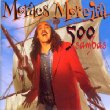|
|

Moraes Moreira There must a genetic music gene characteristic of the state of Bahia in northeast Brazil. How else would you explain so many important names in Brazilian music, such as Caetano Veloso, Gilberto Gil, João Gilberto, Maria Bethânia, Gal Costa, Ivete Sangalo, Batatinha, and many others? Add to that the group Novos Baianos, formed in Salvador (Bahia's state capital) in 1968. The group later on would split up and its members would pursue successful solo careers, as is the case of Baby do Brasil (formerly known as Baby Consuelo), Pepeu Gomes, and Moraes Moreira. Moreira left the group in 1975 and affirmed himself as a strong force in Carnaval music, the Brazilian Mardi Gras celebration. His first Carnaval solo hit was "Pombo Correio" (Carrier Pigeon), a super-charged song full of electric guitars in the most traditional style of the famous "trios elétricos" (electric trios) of Salvador street parades. Another hit penned by Moreira (and co-writer Abel Silva) is Gal Costa's 1981 Festa do Interior (Countryside Party). Always connected to Carnaval and Salvador, Moreira has recently released an album that is destined to produce several Carnaval hits for the 2000 parades. The title, 500 Sambas, makes reference to Brazil's 500th anniversary of the Portuguese arrival on the coast of Bahia. It would be inaccurate, however, to think of this CD as a samba CD. There's samba indeed. The album opens with 500 Sambas, a celebration of samba composers Carlos Cachaça, Cartola, as well as other Brazilian traditions (e.g., soccer) and our religious syncretism. However, what is truly infectious in 500 Sambas is the typical Moraes Moreira frevo style, that electrifying rhythm of the Brazilian northeast Carnaval. In other tracks, Moreira pays tribute to his home state of Bahia. In Festa de ArromBahia (Party of BurstBahia), the focus is the many performers that were born in Bahia, whereas in Estação Bahia (Bahia Station), the people in general take center stage. Yet in Escola Dodô e Osmar/Atrás do Meu Trio (Dodô and Osmar's School/Behind My Trio), Moreira will not forget the duo who made Bahian Carnaval what it is today. Dodô and Osmar were the moving forces behind all the street celebrations in Salvador and its electric trios (huge trucks with musicians parading down the streets of Salvador playing Carnaval music). This album has the right ingredients to be a hit this Carnaval season. In Brazil, it is not too early to start talking about Carnaval, though it will not happen until March 2000. Moraes Moreira can write good frevos. Like most Carnaval music, the lyrics need to be easy to remember, have catchy choruses, and be lively. There is plenty of that in 500 Sambas. This is most definitely a party album for your Carnaval 2000 celebration. Copyright © 2000 Egídio Leitão
|
| © 2011 Luna Kafé |